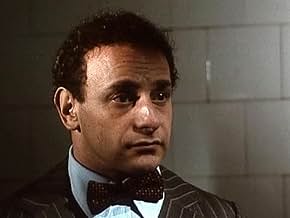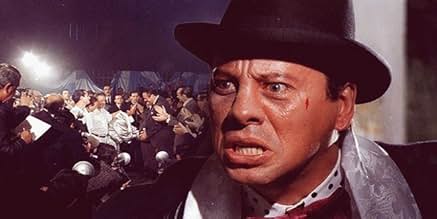José María Gatica fue uno de los boxeadores argentinos más populares de los años cuarenta. Pese a su talento, no supo aprovecharlo y fue autodestuyéndose, despilfarrando el dinero y dejando ... Leer todoJosé María Gatica fue uno de los boxeadores argentinos más populares de los años cuarenta. Pese a su talento, no supo aprovecharlo y fue autodestuyéndose, despilfarrando el dinero y dejando de lado los entrenamientos por la vida nocturna.José María Gatica fue uno de los boxeadores argentinos más populares de los años cuarenta. Pese a su talento, no supo aprovecharlo y fue autodestuyéndose, despilfarrando el dinero y dejando de lado los entrenamientos por la vida nocturna.
- Dirección
- Guionistas
- Elenco
- Premios
- 7 premios ganados y 6 nominaciones en total
Eduardo Cutuli
- Fioravanti
- (as Cutuli)
- Dirección
- Guionistas
- Todo el elenco y el equipo
- Producción, taquilla y más en IMDbPro
Opiniones destacadas
José María Gatica was an Argentine pugilist born in extreme poverty (he never attended school). His technical skills were not up to the best, but he compensated with a wild, free swinging ring style; he came out at the bell throwing non-stop punches and always fought to the bitter end. Extremely popular, he attracted the attention of President Juan Domingo Perón, a boxing enthusiast, who helped finance a trip to the US in quest of a world title. This dream was shattered when he fought World Champion Ike Williams in a non-title bout and suffered a first round knockout. This marked a steady decline in his career although his popularity was unabated for a while. Even people indifferent to boxing were excited by the series of brawls Gatica fought with his arch-rival Alfredo Prada, as legendary as the Sugar Ray Robinson - Jake LaMotta bouts were for Americans.
An improvident man, Gatica squandered or gave away his (at times considerable) income and ended up in poverty. A fervent Peronist, his problems were compounded when, after Peron's overthrow in 1955 he was persecuted and his boxing license was revoked. His old ring rival Prada gave him a job in his restaurant, but at the end of his life he was reduced to selling knick-knacks in soccer games. He was forgotten by his fans, although (in an ironic but not unusual twist of fate) there was an outpouring of popular grief at his funeral.
Gatica el Mono (Mono,"monkey" was one of Gatica's nicknames) makes a good job of putting Gatica's life on screen. Edgardo Nieva plays Gatica to perfection, aided by his striking resemblance to the the original. The whole film rests on Nieva's shoulders (this was his first acting credit). He is supported by an excellent cast. Leonardo Favio's direction tends to the melodramatic here and there, but this is probably intended; after all, Gatica's life seems to have been written by a Hollywood scriptwriter. The cinematography is lush, which suits the subject, and the reconstruction of time and place flawless. Music should perhaps have been toned down in some scenes. Boxing scenes are brutal and realistic. A good movie overall.
An improvident man, Gatica squandered or gave away his (at times considerable) income and ended up in poverty. A fervent Peronist, his problems were compounded when, after Peron's overthrow in 1955 he was persecuted and his boxing license was revoked. His old ring rival Prada gave him a job in his restaurant, but at the end of his life he was reduced to selling knick-knacks in soccer games. He was forgotten by his fans, although (in an ironic but not unusual twist of fate) there was an outpouring of popular grief at his funeral.
Gatica el Mono (Mono,"monkey" was one of Gatica's nicknames) makes a good job of putting Gatica's life on screen. Edgardo Nieva plays Gatica to perfection, aided by his striking resemblance to the the original. The whole film rests on Nieva's shoulders (this was his first acting credit). He is supported by an excellent cast. Leonardo Favio's direction tends to the melodramatic here and there, but this is probably intended; after all, Gatica's life seems to have been written by a Hollywood scriptwriter. The cinematography is lush, which suits the subject, and the reconstruction of time and place flawless. Music should perhaps have been toned down in some scenes. Boxing scenes are brutal and realistic. A good movie overall.
Great tense movie. Sad story of José María Gatica "The Monkey" looks like you're in a theatre watching the tape.
Very raw and artistic movie. Directed by Leonardo Favio.
Total drama.
Very raw and artistic movie. Directed by Leonardo Favio.
Total drama.
I saw this film in Argentina in 1995 on television. This film is perhaps one of the greatest boxing and biopic film ever made in my opinion.
Even if you're not a boxing fan, You'll enjoy the beautiful color this film was photographed in. This film tells the story of an Argentinian boxer who becomes famous and falls faster than the Jake Lamotta character in Raging Bull. Add to all of this the historical background Gatica takes place in. In one of the more amazing scenes I have ever seen the character of Gatica has just lost his son but is more grief stricken by the death of Eva Peron who he has just visted on her death bed. Gatica is a socially detached character who seems to function according to his own rules. He is a womanizer and a brute but the film unlike Raging Bull does not ask us to judge him but to feel what he feels. Gatica is swept up by history even though according to himself he was'nt even that good and did'nt even want to fight. You have to admire the director who makes a Film and not some boring "Playhouse" drama. The film answers some of the toughest questions posed by visual planning scenes out and some great editing and music soundtrack which takes you through the times of 1940's & 50's.
Even if you're not a boxing fan, You'll enjoy the beautiful color this film was photographed in. This film tells the story of an Argentinian boxer who becomes famous and falls faster than the Jake Lamotta character in Raging Bull. Add to all of this the historical background Gatica takes place in. In one of the more amazing scenes I have ever seen the character of Gatica has just lost his son but is more grief stricken by the death of Eva Peron who he has just visted on her death bed. Gatica is a socially detached character who seems to function according to his own rules. He is a womanizer and a brute but the film unlike Raging Bull does not ask us to judge him but to feel what he feels. Gatica is swept up by history even though according to himself he was'nt even that good and did'nt even want to fight. You have to admire the director who makes a Film and not some boring "Playhouse" drama. The film answers some of the toughest questions posed by visual planning scenes out and some great editing and music soundtrack which takes you through the times of 1940's & 50's.
Based on some of the enthusiastic reviews that I read here (including one claiming that this film "makes Raging Bull look like a kindergarden film"), I was expecting a very raw, potent biopic about José María Gatica, also known as "El Mono" ("The Monkey"), a popular Argentine boxer who fought in the 40s and 50s, whose personal life was undone by excess and decadence. Instead, the film feels stagey and melodramatic. The music is too sentimental. Much of the acting, especially Eduardo Nieva's in the main role, feels forced. I think he tries a bit to imitate Al Pacino or Robert De Niro, but his constant screaming isn't visceral, just annoying. Gatica does come across as an out-of-control nouveau riche (who reminded me a lot of a certain Argentine football legend), but his portrayal of the character isn't compelling enough to keep one interested throughout two hours. I think Erasmo Olivera, who plays the younger Gatica, has significantly more presence on the screen. The photography is sometimes quite powerful, while other times it risks being overly nostalgic. Probably the movie's strongest point, it seems inspired by some of the films of Francis Ford Coppola or Bernardo Bertolucci. I was disappointed by most of the fighting scenes, with one exception, a surreal moment that combines unakin visual and sound elements: on the one hand, slow-motion shots of two boxers resting between rounds, panting heavily, sweating and bleeding profusely, and on the other, the voice of a priest delivering Mass in Latin. It happens unexpectedly and, although hard to explain exactly why, it works like magic. Somehow, the whole is greater than the sum of its parts. I wish there had been more surprises like that, more unpredictability and mystery. To be fair, this is an undeniably ambitious, probably fairly expensive period film with great production (costumes, cars, etc.) But perhaps the project became too large and complex for the director to pay attention to the details and give life to the characters. Gatica's story is unique and sad, worthy of a biopic. But the film lacks punch, if you'll pardon the pun. I actually found it painful to watch – unfortunately, for all the wrong reasons.
This is probably one of the worst films of all time. Bad in all departments, it is an insult to the audience that certain people praise this mistake.
There is nothing good to rescue from this piece of trash. In comparison, any film directed by Enrique Carreras is much better.
Even though, the only good thing featured in this disaster is the Mariano Mores theme "Tanguera", which was better recorded in 1955 by the Francini-Pontier orchestra for RCA Victor.
There is nothing good to rescue from this piece of trash. In comparison, any film directed by Enrique Carreras is much better.
Even though, the only good thing featured in this disaster is the Mariano Mores theme "Tanguera", which was better recorded in 1955 by the Francini-Pontier orchestra for RCA Victor.
¿Sabías que…?
- TriviaOfficial submission of Argentina for the 'Best Foreign Language Film' category of the 66th Academy Awards in 1994. However, it was pulled out of the competition by director Leonardo Favio himself as form of complaint about the problems of the film industry.
- Bandas sonorasTengo mil novias
Written by E. Cadicamo & E. Rodríguez
Selecciones populares
Inicia sesión para calificar y agrega a la lista de videos para obtener recomendaciones personalizadas
Detalles
- Fecha de lanzamiento
- País de origen
- Idioma
- También se conoce como
- Gatica, the Monkey
- Locaciones de filmación
- Productoras
- Ver más créditos de la compañía en IMDbPro
- Tiempo de ejecución2 horas 16 minutos
- Color
- Mezcla de sonido
Contribuir a esta página
Sugiere una edición o agrega el contenido que falta

Principales brechas de datos
By what name was Gatica, el mono (1993) officially released in Canada in English?
Responda





















